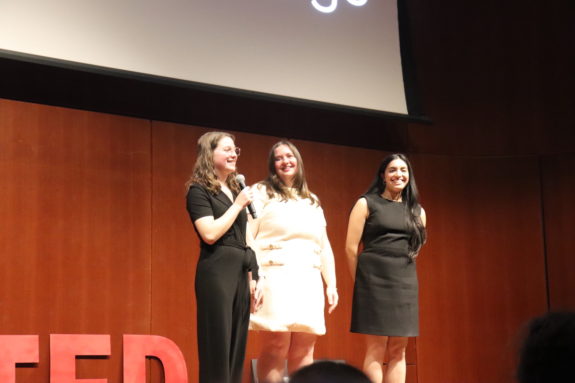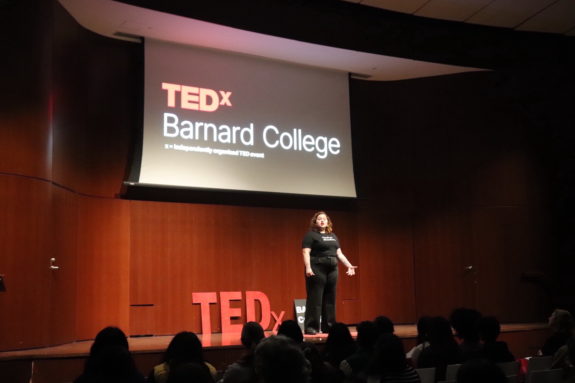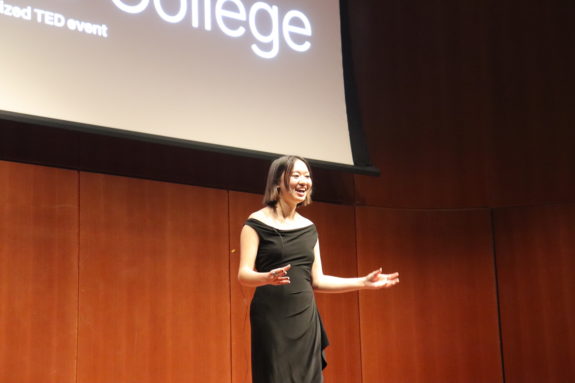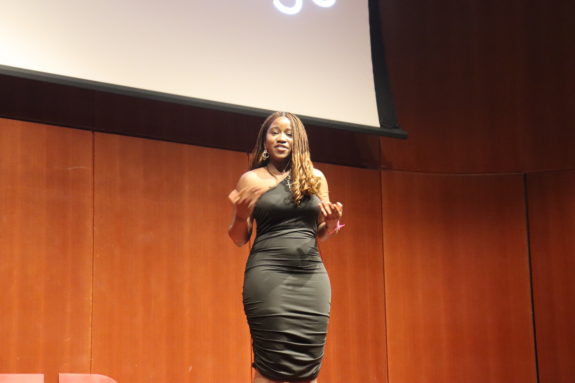On Thursday evening, the Barnard Speaking Center hosted the TEDx Barnard College, featuring nine inspiring speeches on a wide range of topics.
“There’s no right way to speak unless you say what you mean.” This poignant message is the core of Barnard’s Speaking Center pedagogy and was introduced by the Speaking Fellows who coordinated Barnard’s first TEDx Event—Hanna Bloomquist (BC ’25), Abby Bonat (BC ’25) and Anusha Merchant (BC ’25). “Say what you mean” became the core tenet of this event, as nine Barnard students told their stories and shared messages of curiosity, inspiration, and action. Alongside messages from Daniela Kempf, the Associate Director of the Barnard Speaking Program, and Sarah Batchu (BC ’16), this event was entirely student-centered, serving as a testament to the brilliance of the Barnard community.

Rissa Kei Chua (BC ’24) kicked off the speeches by talking about Catastrophic Thinking—or Cat Thinking—and the way it has impacted her own mental and physical health. Chua explained the extreme levels of stress she faced upon entering Barnard, and how her worry about academics, success, and life ended up taking a physical toll on her. In March of 2023, Chua’s stress adopted new physical symptoms, and parts of her body ended up paralyzed. Chua was affected by Guillain-Barre Syndrome, a rare syndrome in which your body’s nervous system attacks its own nerves. She had to re-learn how to perform all daily activities. However, she reflected on this by saying she was “grateful for a second chance to recalibrate,” since, for the first time in a long time, she finally had a chance to free her mind and focus on recovering her physical health. Chua drew attention to the fact that “fear of failure drives us toward anxiety” at institutions like Barnard, and that in a society “obsessed with our next big win,” it’s necessary for us to step back and reflect on where our thoughts and anxiety are coming from.
After Chua left the stage, Isabella Villa Real Seabra (BC ’24) addressed the audience with the phrase “raise your hand if you’ve ever heard an abortion story.” After many people in the audience lowered their hands, Villa Real Seabra started her speech about abortion stigma and how people who have had abortions are left out of these important conversations. “If abortion is so common, why don’t we talk about it?” asked Villa Real Seabra, as she urged everyone to “listen to abortion stories with empathy and compassion, silence the stigma, and join the conversation.” She emphasized the importance of storytelling, and how “silence does not serve us.”

Soon, Isis Contreras Pérez (BC ’26) called the audience’s attention toward the racial disparities of climate change’s effects on different communities, including in urban areas like NYC. She called out the role of redlining and current discriminatory policies in creating “urban heat islands” and its negative effects on community members’ health, citing Harlem as an example. Contreras Pérez referenced the pressing problem of the Urban Heat Island effect and called out Columbia and Barnard for their impact in the gentrification of the area and their acceptance of donations from companies with big carbon footprints. Contreras Pérez closed her speech by warning that “as Barnard students we are insulated by a bubble,” which can isolate us from the harsh reality of how neighboring communities are harmed by the very institutions that we support and fund. She called for a larger focus on organizations like the Harlem Heat Project and emphasized a need for us to listen to the “real people impacted.”
In another commentary about Columbia and its surrounding community, Habiba Sayma (BC ’24) talked about inequity in the education system. She focused on the idea that “not all public schools are created equal.” Sayma explained how at one period in life she needed to study during early morning hours in order to get into a prestigious high school with rigorous instruction in New York—a school that, despite its academic reputation, was not diverse. She talked about injustice within the NYC public school system, as compared to the plethora of resources at Barnard. Later, she implored Barnard to partner with under-resourced schools, with facilities like computer labs and the Writing Center that could be beneficial to NYC students. Sayma ended by remarking that “we must practice symbiotic relationships with the community we’re immersed in.”
To complete the first half of the speeches, Olivia Bobrownicki (BC ’25) talked about the lack of data representing women across fields and studies: “we have systematically failed to take data on women.” Bobrownicki talked about the increased risk of injury for females in car crashes due to car designs reportedly being based on data collected only from men, as well as the reportedly higher instances of negative side effects of multiple medications on women due to using all-male trials. “We live in a society where we treat every body as an average male,” Bobrownicki said as she compelled the audience members to find the intersection between their various fields of study, the need for female data, and the areas where women are most at risk, in order to work towards changing it.
After a short intermission, Rachel Yuan (BC ’26) continued the evening of speeches with her talk about news media literacy. “As a seventh grader I thought I was very intelligent” is how Yuan described the beginning of her journey as an avid news media reader. She also talked about her experience watching her friends and family “become mouthpieces for” the news they watched in 2020 and the risks of creating for ourselves an “echochamber” of information when only reading from the same sources. To counter this phenomenon, Yuan offered three tips: to read beyond the headlines, pay attention to quotation marks, and take notice of journalism jargon.

Shifting into a more personal topic, Olaedo Udensi (BC ’26) gave a speech about the socio-cultural importance of honoring our names and of pronouncing them correctly. Udensi talked about her experience at boarding school in the UK and shortening her name to “Ola” for people who thought of her name as “scary” or “jarring.” She spoke about how her name is a “beautiful” one—a name that, in her home country of Nigeria, sounds like “melted butter on bread, or melting ice cream on a hot day.” She called upon us to take the time to learn the correct pronunciation of names and to revel in their history and culture.

Abigail Fleming (BC ’26) spoke about “being broke at Barnard,” and the institutional attitude towards first generation and low income (FLI) students. Fleming related her own negative experiences with the Financial Aid Office and described the need to improve the language of the different College offices when interacting with FLI students as well as inequitable college policies, like summer housing. Fleming reflected that “the bravery of being broke in a space [that is] otherwise wealthy” relies on the small gestures and interactions that other people don’t witness but which FLI students must endure on their own. She called for FLI students to be more than just a statistic during campus tours and to push for greater respect, policy responsiveness, and dignity.
“If every word represents a single drop of wisdom, how deep is our ocean of misunderstanding?” Daniella Sapone (BC ’25) closed off the speeches with a discussion on her experiences communicating with a stutter and the ways in which we need to re-focus our attention on truly listening to each other. “As a child, I did not shut up,” Sapone said, making the audience chuckle. “My name is Daniella Sapone and I started stuttering when I was ten years old.” Sapone talked about her experience with communication and the lack of attention that classmates give each other in the classrooms. She called us to think about how our culture encourages interrupting, scrolling on our phones, and planning our next point while someone else talks. Sapone urged the audience to “reimagine the way we define effective communication,” and shared her experience writing, composing, and acting in her first musical, “Lemon Water,” where the team truly listened to each other. She concluded with gratitude: “thank you for listening to me and to us, and I hope you continue to do so.”
Alumna Sarah Batchu (BC ’16) delivered concluding remarks, stating that Barnard was the place she found her voice and that it informed her career in policy. This event served as a testament to the wisdom and insights Barnard students have for our community and world.
This article has been edited to correct a speaker’s name.
TEDx Speakers via Tal Bloom


 0 Comments
0 Comments